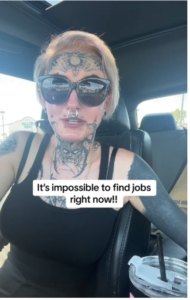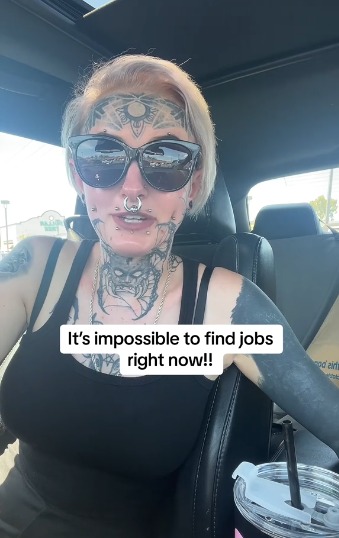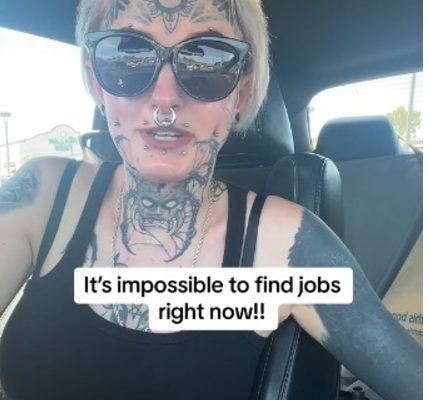 Many job seekers who have faced rejection wonder why they didn’t qualify. Was it a lack of experience, their presentation, or something beyond their control?
Many job seekers who have faced rejection wonder why they didn’t qualify. Was it a lack of experience, their presentation, or something beyond their control?
This question hit home for 23-year-old Ash Putnam, who recently applied to TJ Maxx, only to face rejection. Frustrated and looking for answers, she shared her experience on TikTok. Her video quickly gained traction, racking up over 7 million views and sparking a conversation among thousands of commenters who resonated with her experience. In the video, Ash expressed her confusion and frustration about the job search process, especially as a young adult navigating entry-level positions. The comments, however, seemed to reflect a consensus that surprised her.
In the viral video, Ash explains how she applied for a job at TJ Maxx, only to receive an automated rejection email a few weeks later.
“They couldn’t even call me,” she shared. “They just sent me some automated email.”
Feeling dissatisfied with the impersonal response, Ash decided to visit the store in person to seek more clarity. She approached the staff and politely asked why her application hadn’t been successful.

“I went in today and was like, ‘So what was the reason why I didn’t get hired?’” she recalled. “The response I got was, ‘Oh, you just don’t have enough experience. There were candidates with more experience than you.’”
In that moment, Ash began to question if there might be other factors at play. Concerned about her tattoos, she asked if that could have influenced their decision, given that some workplaces still have policies that frown upon visible body art. According to Ash, the staff member assured her that it wasn’t about her tattoos—but she wasn’t fully convinced.
“Just because I have tattoos doesn’t mean I wouldn’t make a good employee. That logic just doesn’t make sense to me. Some of the most educated, capable people I know have tattoos and piercings,” she commented passionately.
Despite her unanswered questions, Ash’s story resonated with thousands on TikTok, many of whom had faced similar concerns or felt that appearance influenced hiring decisions. Several users commented, sharing opinions from various professional perspectives.
One user, a tattoo artist, suggested that it was “probably the tattoos.”
An HR supervisor added, “There’s no way any company would want to put someone with visible tattoos in a customer-facing role at a place like TJ Maxx.”
Another commenter who claimed to have worked at TJ Maxx commented, “They’ll hire almost anyone who walks in. It’s definitely the tattoos and piercings.”
Still, others speculated that it might not simply be the presence of tattoos, but rather the type or placement of her tattoos that caused concern. “I don’t think it’s just that you have tattoos… I think it’s WHERE you have them,” one comment read.
Ash herself began to suspect the same. In an interview with The Daily Star, she explained her feelings, saying, “I absolutely do think it’s about my tattoos because apparently, people find them demonic or scary.”
She went on to share that, while TJ Maxx didn’t officially cite her tattoos as the reason for her rejection, many people on TikTok offered unfiltered opinions about her appearance. Some of the harsher comments suggested she would be better suited for a job at a Halloween store or a circus.
For Ash, the situation points to a broader issue. She feels that, if body art is the reason some employers may hesitate to hire her, businesses should reconsider their hiring policies. The topic raises important questions about workplace inclusivity and the impact of physical appearance on professional opportunities.
Ash’s story has sparked debate, as countless TikTok users have joined in to discuss whether society’s views on tattoos have truly evolved. While many companies claim to embrace diversity and inclusion, body art remains a gray area. Some workplaces are open to employees expressing their individuality, while others hold to more traditional standards.
As tattoos become increasingly mainstream, especially among younger generations, many feel it’s time for policies to reflect a changing society. After all, one’s appearance doesn’t necessarily dictate their qualifications, dedication, or professionalism. Supporters of Ash’s stance argue that outdated views on body art often overlook the value and potential employees bring beyond their appearance.
For Ash, this rejection is just one setback in her job search, but she’s hopeful that her experience will encourage more conversations around hiring practices. She aspires to work somewhere that values her skills and qualifications rather than making assumptions based on her appearance.
To the thousands who resonated with her video, Ash’s story serves as a reminder that everyone’s journey through the job market comes with its unique challenges. For now, she continues her role at Uber Eats, navigating the workforce as she seeks a workplace that embraces her as she is—tattoos and all. And as her TikTok followers watch her journey unfold, the hope is that more businesses will begin to recognize the value of embracing diverse expressions of individuality in their employees.



